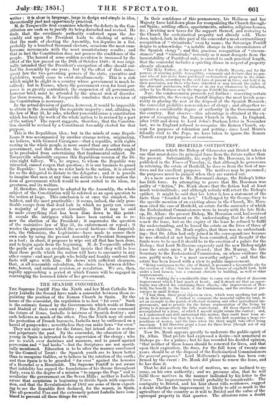THE SPANISH CONCORDAT.
THE Supreme Pontiff Pins- the Ninth and her Most Catholic Ma- jesty Isabella the Second have.made a concordat between them re- gulating the position of the Roman Church in Spain. By the terms of -the concordat, the regulation is to last " for ever." Such is the estimate formed by the Governments which reside at Rome and. Madrid of their own stability : Pius the Ninth can command the future of Rome, Isabella is mistress of Spanish destiny ; and each believes as much of the other. Pius the Ninth may sit under the protection of French bayonets, Isabella may be enthroned on a barrel of gunpowder ; nevertheless they can make laws " for ever." They not only answer for the future, but intend also to restore and perpetuate the past. By the concordat, the education of the young in Spain is intrusted to the supervision of the clergy ; who are to watch over doctrines and manners, and to guard against Perversion and " bad books "—but the Scriptures are not speoifi- callysinentioned. Education is to be after the manner sanctioned by the Council of Trent : the Spanish youth are to know better than to 'recognize 'Galileo, or to believe in the rotation of the earth ; and thus Spain is to be guarded " for ever" against the heresies of a Hersehel or a. Humboldt. The Supreme Pontiff is not aware that infidelity has sapped the foundations of his throne throughout Italy, even to the degree of a mission " to unpope the Pope " and to secularizei4he government on 'the Seven Hills ; neither is Isabella aware that scepticism is beginning to divide Spain with supersti- tion, and that the Revolutionists of 1852 are some of them expect- ing to see the Republic first declared, for the season, in Spain. The all-powerful Pius and the extremely potent Isabella have com- bined to prevent all these things for ever. In their confidence of thisanency, his Holiness and her Majesty have laid down plans /Olt:iv:organizing the Church through- out Spain ; settling offices, appointments, salaries, religious houses, &c. ; devising new taxes for the support thereof, and restoring to the Church the ecclesiastical property not already sold. There does, indeed, lurk in this part of the concordat a most extraordinary recognition of " vicissitude," even by name ; the Sovereign Pon deigns to acknowledge "a notable change in the circumstances of the Spanish clergy "; and this gracious recognition of " circum- stances " and "vicissitude," seriously as it must derogate from the immutability of Pontifical rule, is carried to such practical length, that the concordat includes a quieting clause in respect of property already alienated.
"The Holy Father, at the request of her Catholic Majesty, and for the purpose of securing public tranquillity, commands and declares that no per- sons who of late years have purchased ecclesiastical property in the domi- nions of Spain, according to the civil laws at present in force, and hold it in their possession, nor those who have inherited or may inherit the rights of the aforesaid purchasers, will ever or in any way whatsoever be disturbed, either by his Holiness or by the Supreme Pontiffs his successors."
Nay, the condescension proceeds yet further : reserving certain appointments, the Sovereign Pontiff displays the most lavish gene- rosity in placing the rest at the disposal of the Spanish Monarch ; the concordat prohibits non-residence of clergy ; and altogether re- cognizes a considerable degree of authority in the Government of the country. But observe—this advantage is obtained at the ex- pense of recognizing the Roman Church in Spain. In England, after 1829 and down to Lord John's Durham letter in November last, we in England refused to recognize the Roman Church, ex- cept for purposes of toleration and petting ; since Lord Minto's friendly visit to the Pope, we have taken to ignore the Roman Church except for purposes of coercion.


























 Previous page
Previous page